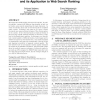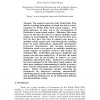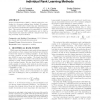2504 search results - page 27 / 501 » Methods for comparing rankings of search engine results |
EPEW
2005
Springer
14 years 4 months ago
2005
Springer
The PageRank algorithm is used by search engines such as Google to order web pages. It uses an iterative numerical method to compute the maximal eigenvector of a transition matrix ...
SIGIR
2010
ACM
14 years 2 months ago
2010
ACM
Ranking search results is a fundamental problem in information retrieval. In this paper we explore whether the use of proximity and phrase information can improve web retrieval ac...
WWW
2011
ACM
13 years 5 months ago
2011
ACM
Web pages are usually highly structured documents. In some documents, content with different functionality is laid out in blocks, some merely supporting the main discourse. In ot...
WEBNET
1996
13 years 12 months ago
1996
: The explosive growth of the World Wide Web, and the resulting information overload, has led to a miniexplosion in World Wide Web search engines. This mini-explosion, in turn, led...
SIGIR
2009
ACM
14 years 5 months ago
2009
ACM
Reciprocal Rank Fusion (RRF), a simple method for combining the document rankings from multiple IR systems, consistently yields better results than any individual system, and bett...



